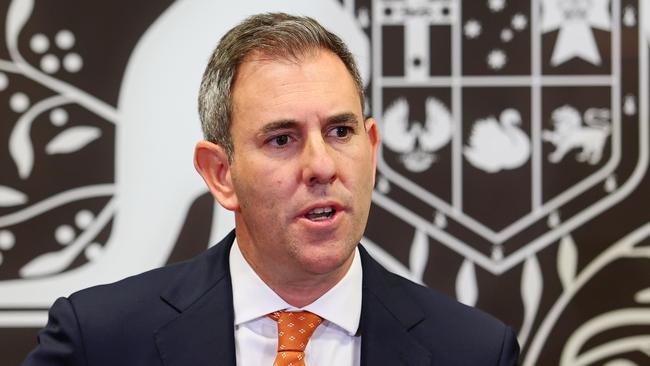Jim Chalmers arrives in Beijing seeking clarity on China economic “weakness”
The Treasurer has landed in Beijing where he will seek clarity on what the troubles in China’s economy mean for Australia and his next federal budget.

Treasurer Jim Chalmers has arrived in Beijing for meetings with top Chinese policy makers as he tries to get more clarity on what the “weakness” in China’s economy means for Australia and his next budget.
Beijing welcomed the Australian Treasurer who arrived early on Thursday, saying that Dr Chalmers’ upcoming meetings were an “important mechanism” for economic discussion between the two countries.
A spokesman for the Chinese foreign ministry told The Australian that China wanted to “build a more mature, stable and fruitful” partnership with Australia.
After a briefing with Australia’s Ambassador in China, Scott Dewar, the Treasurer on Thursday afternoon will meet with National Development and Reform Commission chairman Zheng Shanjie, whose institution oversees China’s five-year economic plans as well as the country’s foreign investment regime.
Dr Chalmers and Mr Zheng will co-chair the Australia-China Strategic Economic Dialogue, the first time the meeting has taken place since 2017 when the countries’ bilateral relationship began to go off the rails.
The Global Times reported that there were “high expectations” for the Australian Treasurer’s visit.
“His visit to China is expected to not only promote bilateral economic and trade relations but also to enhance the overall bilateral relationship,” the Beijing mouthpiece reported.
“Additionally, there may be opportunities for breakthroughs in co-operation between the two nations in new areas, particularly in addressing climate change and clean energy initiatives,” the Global Times reported.
In a demonstration of the importance of the Chinese economy to the federal budget, Dr Chalmers last week sounded out chairs, chief executives and senior executives at mining giants Rio Tinto, BHP and Fortescue, gas major Woodside, retail and mining conglomerate Wesfarmers, investment giant Macquarie, Chinese-focused law firm King & Wood Mallesons, steelmaker BlueScope, Sydney Airport, hearing aid maker Cochlear, agribusiness GrainCorp and the Business Council of Australia.
People familiar with the discussions between Dr Chalmers and a clutch of the most influential figures in corporate Australia said they had stressed the importance of the Chinese economy to Australia but also the uncertainty about what a raft of strategic disagreements between Canberra and Beijing meant for Australian businesses looking to work with Chinese partners.
Last week, an Australian air force plane was described as an “enemy” in a bombastic documentary run on China’s national broadcaster, CCTV.
Dr Chalmers acknowledged the ongoing tension in the relationship in comments made before flying from Brisbane.
“Our relationship with China is full of complexity and opportunity,” he said. But he indicated that he wanted to strike a positive note during his visit.
“We recognise a more stable economic relationship between Australia and China is a good thing for Australian workers, businesses, investors and our country more broadly,” Dr Chalmers said.
“We recognise that there’s a lot at stake and a lot to gain from the relationship with China.”
Dr Chalmers’ visit follows a recent trip by Climate Change and Energy Minister Chris Bowen. Trade Minister Don Farrell is expected to visit Shanghai in November.
After coming under pressure from Australia’s most powerful business and mining lobbies, the Albanese government is trying to spotlight its management of the China relationship, which has improved from the parlous state of the Turnbull-Morrison years.
Most of China’s trade blockages once worth $20bn a year have been wound back by Beijing, although the Australian live lobster black-listing continues.
However, the slowing Chinese economy has replaced the bilateral relationship as the biggest source of anxiety for many China-facing Australian businesses.
Dr Chalmers said his meetings with key Chinese economic policymakers would allow him to “compare notes” on the state of the world’s second biggest economy. “We’ve seen a weakness in the Chinese economy which obviously has consequences for us,” he said on Wednesday. “We’re not immune from weakness in the Chinese economy.”
The trip comes during a woeful time for China’s steelmakers, by far the largest customer for Australian iron ore miners.
“China’s steel industry has entered a reduction cycle,” Wang Guoqing, head of research at Beijing’s Lange Steel Information Centre, told The Australian.
She advised Australian iron ore giants to “consider reasonable profit margins” as their Chinese steel-producing customers endured their worst crisis since 2015.
Beijing has long complained about the huge profits made by Australia’s iron ore giants. Dr Chalmers’ Chinese counterparts are expected to raise Canberra’s regulatory process for investment from China, a source of frustration and even anger since 2017.
“It will be one of their top talking points,” said a source familiar with preparatory discussions before the dialogue.
Chinese government officials will likely acknowledge the weakness in their economy while insisting Beijing is responding with targeted measures.
This week Beijing released new stimulus measures including cuts to its benchmark interest rate, support for the struggling Chinese sharemarket and still more aid for the troubled real estate sector as policymakers try to enliven an economy struggling to meet its annual 5 per cent target.






To join the conversation, please log in. Don't have an account? Register
Join the conversation, you are commenting as Logout